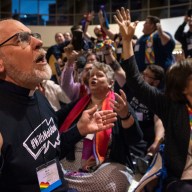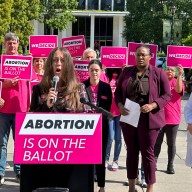Being gay doesn’t make you any less Muslim, at least not to Faisal Alam.
It’s a message he has and will continue to spread through Al Fatiha (The Opening), a worldwide support organization for gay, lesbian, bisexual and transgender Muslims he founded and directs. He was honoured for his work with a Pride Toronto Award of Excellence at the Pride Gala & Awards Show last night at the Distillery District for his work in spirituality.
“It feels really good,” says Alam, 30. “In many Pride festivities, faith-based groups are often neglected.”
Alam says this group is of particular importance because of the danger facing Muslims who come out in some countries, where homosexuality can be tantamount to a death sentence (he mentions Saudi Arabia and Iran as two culprits). But Islam, he says, has never condemned homosexuality, and traditionally never intruded into the bedrooms of its followers. He believes with the imposition of Victorian-era values onto the religion, intolerance of sexual orientation is relatively recent, and that Islamic communities are gradually becoming more accepting of those who choose different lifestyles.
“Most institutions are still very strict, very conservative about it, but that’s beginning to change,” says Alam. “Canada, for instance, is a microcosm of all the different facets of the Muslim world. If you don’t like what your mosque is preaching, you can always go to another mosque more suited to your ideology.”
Al Fatiha is certainly not neglected in other circles. In its 10 years of existence, the group has gone from being an online discussion board to an estimated 2,500 members with chapters in Canada, the U.S. and the U.K. — the first one was established in Toronto. Alam says the group is viewed by fundamentalists and extremists as a threat, however, adding two fatwahs have been declared against Al Fatiha in the U.K., though not by any institutionalized organization.
It’s not something that scares Alam. The member of the National Religious Leadership Roundtable in the U.S. says the real challenge is establishing a dialogue with religious authorities, who are often from older, more rigid generations. He claims they often use passages in the Qur’an to attack GLBT Muslims.
“It happens in many religions, not just Islam. The religious leaders will use the text as a weapon to marginalize the group that is different. People in positions of power don’t want to relinquish that power,” he said. “It’s too easy to look at the passages that way, but what they’re not doing is looking at the lives being affected. People are leaving the faith because they’re being told God hates them because they’re gay.”
>> For more information, visit www.al-fatiha.org.
















